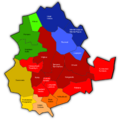Province facts for kids
A province is like a big area or region within a country. Think of it as a way to divide a country into smaller, easier-to-manage parts. It's a type of local government, which means it helps manage things like schools, roads, and local rules for the people living there.
The word "province" comes from the old Latin word provincia.
Many countries around the world use provinces to organize themselves. For example, Canada, South Africa, the Netherlands, Pakistan, Spain, and Denmark are all divided into provinces.
Some very small countries, like Singapore or Monaco, don't need to be divided into provinces because they are already tiny.
What Are Provinces For?
Provinces help a country's government work better. Instead of one big government trying to manage everything for an entire country, provinces can take care of local needs. This makes it easier to provide services and make decisions that are right for the people in that specific area.
Different Names for Similar Areas
While many places use the name "province," other countries use different names for their main subdivisions. These areas are similar to provinces but might have different levels of power or responsibility.
Here are some examples:
- Département: This is what France calls its main regions.
- Canton: Switzerland uses cantons as its main divisions.
- State: Countries like the United States, Mexico, Brazil, and Australia are divided into states.
- Bundesland: This is the name for the states in Germany and Austria.
- Voivodship: Poland uses voivodships.
- District: You'll find districts in places like Serbia (where they are called okrug), Belize, and Bhutan.
- Prefecture: Japan uses prefectures (県).
- Estados: This is what the states in Venezuela are called.
- County: The United Kingdom is divided into counties.
- Suba: This is a term used in Pakistan.
- Pradesh: This is a Hindi word for states, used in the Republic of India.
- Fylke: Norway uses fylke.
- Parish: You'll find parishes as divisions in Jamaica and Trinidad and Tobago.
Generally, areas called "departments" might have less power than a typical province. On the other hand, "states," "Bundesländer," and "autonomous communities" often have more power and can make more of their own rules than a province.
Images for kids
-
The Roman Empire and its administrative divisions, around the year 395.
See also
 In Spanish: Provincia para niños
In Spanish: Provincia para niños
 | Emma Amos |
 | Edward Mitchell Bannister |
 | Larry D. Alexander |
 | Ernie Barnes |



